July 07, 2020
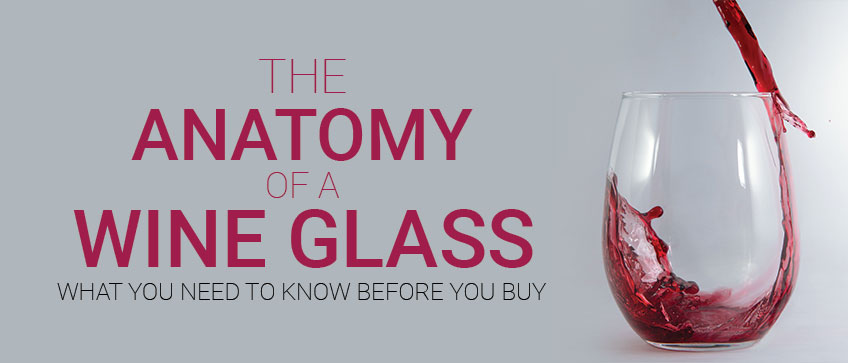
Before you begin your journey into buying wine glasses, you will need to understand the design and construction of these uniquely shaped glasses. Their shape actually shapes your wine tasting experience significantly. As delicate as the wines we pour into them, sipping reds and whites through these drinking vessels can enhance the aromas, notes, and affect how the wine is aerated.
Browse our wine glass selection here.
.jpg)
Wine Glass Construction
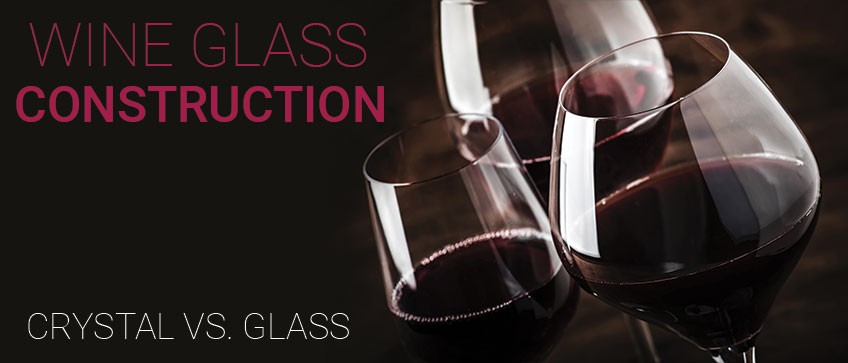
Wine glasses are often constructed from either glass or crystal, not only for the opulent appearance but because these materials can be easily shaped to create brilliant glassware. Crystal wine glasses contain lead oxide, this gives the glass its clarity and sparkle but also makes it a more resilient and stronger material.
This allows the crystal to be shaped into a thinner and more delicate design. Crystal stemware is also microscopically coarser in texture, which enhances the aroma's intensity when the wine is swirled. This intense aroma will change your wine tasting experience intensifying the flavors, allowing you to pick up on subtle notes.
After the glass-blowing process, traditional wine glasses made of glass are actually actually less fragile than crystal glassware. The sturdier glass material means you can find dishwasher-safe versions. When shaped by an artisan glassblower, glass stemware can be just as delicate and elegant as crystal.
Glassware Shaping Method
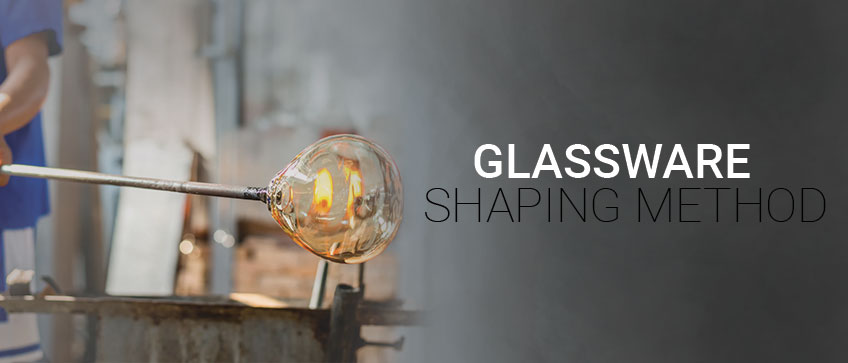
Hand-blown glassware is the most premium glassware you can encounter. Hand-blown glass is artisan-crafted and generally thinner than machine-made glassware. This technique allows the artisan to create more elegant and delicate glassware. Hand-blown glassware often results in a lightweight, yet balanced glass because of the thin and smooth edges. Of course, these glasses tend to be much more expensive than machine-produced glass.
Machine-blown glassware is a more inexpensive option but doesn't result in an as delicate or elegant finished product. When a machine creates glassware, molten glass is shaped using compressed air. This ensures consistency in the shape and quality of the glasses.
These days many glasses are a hybrid of hand-blown and machine-shaped glass. The bowl of the glass is often hand-blown to ensure they are delicate ad perfectly thin, providing the best-tasting wine every sip. The stem and the base are machine-made for quality and consistency.
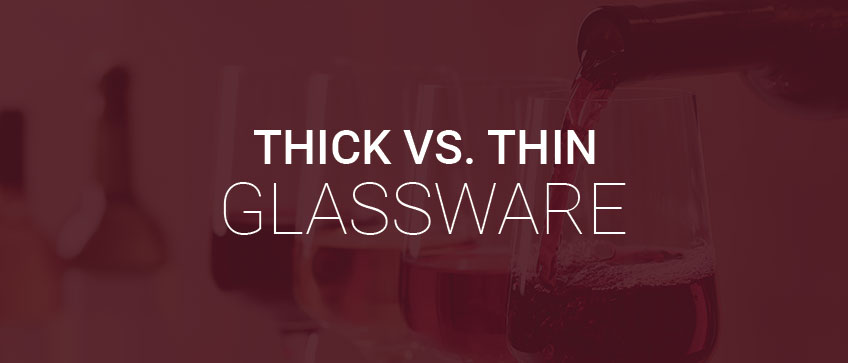
Thick vs. Thin Glassware
Thicker wine glasses have a sturdier construction and therefore, are less likely to be easily broken and are dishwasher-safe. However, these glasses often have rolled rims, which prevent the smooth flow of the wine into your mouth. This will accentuate the acidity and harshness of the wine, making it less appealing to drink.
Thin glassware is ideal and the thinner, the better. Ideally, paper-thin wine glasses will provide will maintain the cool temperature of the wine. Thin glasses also have a cut rim, instead of a rolled one, which allows the wine to flow smoothly on to the tongue. This reduces the acidity and harsh notes, permitting the subtle flavors and brighter flavors to dance on the tongue.
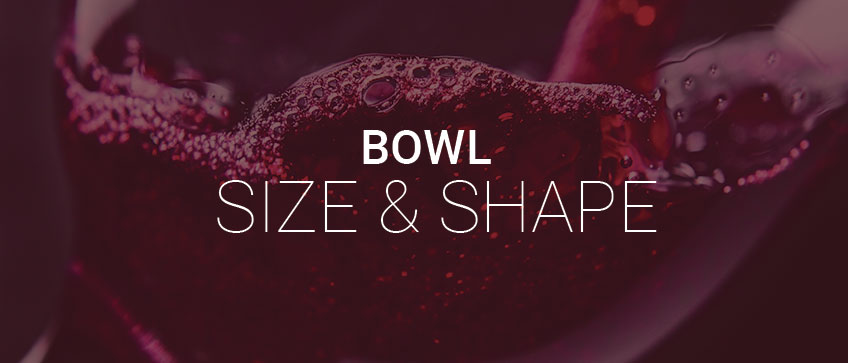
Bowl Size & Shape
Wide bowls increase the surface area and encourage alcohol evaporation, maximizing the oxidation and releasing the wine's aroma. Red wines often have a very complex aroma, which translates to complex flavors, which is why you will often find red wines served in glasses with wide bowls. Wide bowls also allow you to swirl the wine around to disrupt the volatiles and tannins, enhancing the subtle flavors of the wine.
Lighter wines, like white wines, are best enjoyed with less oxidation because of the delicate notes. A narrow bowl size minimizes the oxidation and preserves the chilled temperature and delicate wine bouquets. When serving carbonated wines, like champagne or sparkling wines, the more narrow the bowl shape, the less likely for the carbonation to dissipate. This is why you often see champagne flutes, which are extremely narrow and elongated to prevent the carbonation from being lost.
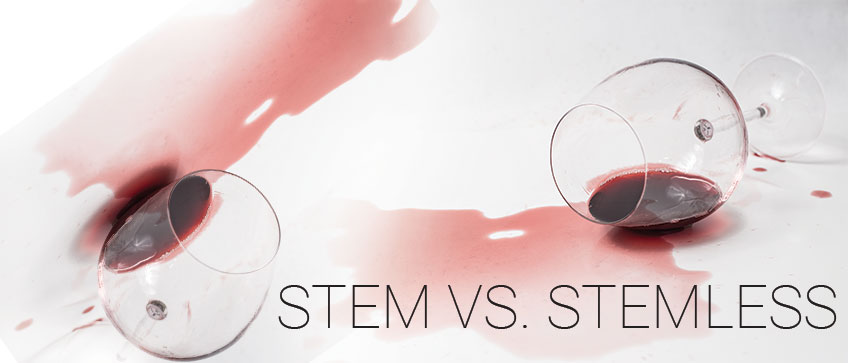
Stem vs. Stemless
Traditional wine glasses have a long thin stem from the base of the bowl of the glass and are connected to a base for the glass to stand on. This stem allows the user to pick up the glass without touching the bowl and heating up the wine, which can change the flavors and notes in the wine. Stemmed wine glasses can also be store upside down with a wine glass rack, preventing dirt and dust from settling into the bowl. The downside of these glasses is that they are often very delicate and if they're accidentally knocked over, they are very likely to shatter.
Stemless glassware has become popular over the years for its aesthetic but also for those who are clumsy. Knocking over a stemless wine glass is less likely to result in broken glassware; however, you will need to be careful about warming up the wine while you hold your glass. These glasses are very multi-purpose and can be used to serve a variety of other beverages.
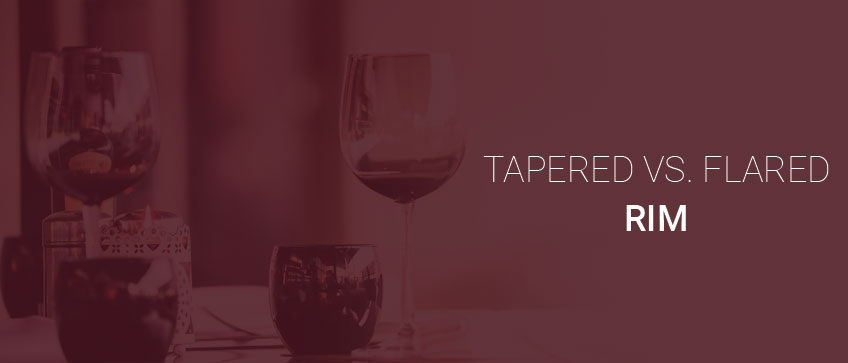
Tapered Rim vs. Flared Rim
A tapered rim suspends the aromas at the top of the glass and prevents them from escaping when swirling the wine. This type of glass allows you to get the full nose of the wine and allows you to take in very subtle aromas. The tapered edge also prevents spilling from swirling the wine.
A glass with a flared rim traps the aroma and allows the flow of the aroma to be directed to the front palate. This highlights the rich fruit flavors in the wine while tempering the acidity as your taste it.

Types of Wine Glasses
Stemware comes in a wide variety of shapes and sizes, varying wildly by brand. The general rule of thumb is glasses with wider bowls is best for red and more narrow bowls are best for white wines. Many varieties of wine have their own glass shape to help enhance their specific aromas and flavors. We'll go into specific wine stemware in a different article but you can always contact our team of product experts at 800-710-9939 for help choosing stemware.


 Single Faucet Kegerator Beer Dispensers
Single Faucet Kegerator Beer Dispensers Dual Faucet Two Tap Kegerators
Dual Faucet Two Tap Kegerators Triple Faucet Three Tap Kegerators
Triple Faucet Three Tap Kegerators Undercounter Built-In Kegerators
Undercounter Built-In Kegerators Outdoor Kegerator Beer Dispensers
Outdoor Kegerator Beer Dispensers Commercial Kegerators
Commercial Kegerators Mini Kegerators
Mini Kegerators Cold Brew & Nitro Coffee Dispenser Kegerators
Cold Brew & Nitro Coffee Dispenser Kegerators Carbonated Water Kegerators
Carbonated Water Kegerators Home Brew Kegerators
Home Brew Kegerators 15" Kegerators
15" Kegerators Kombucha Equipment
Kombucha Equipment Guinness® Dispensing Kegerators
Guinness® Dispensing Kegerators Vending Kegerators
Vending Kegerators Wine Kegerators
Wine Kegerators Kegerator Cabinets
Kegerator Cabinets Kegerator Covers and Accessories
Kegerator Covers and Accessories Kegerators
Kegerators Kegerator Conversion Kits
Kegerator Conversion Kits Kegs & Keg Accessories
Kegs & Keg Accessories Beer Faucets
Beer Faucets Beer Shanks
Beer Shanks Draft Beer Towers
Draft Beer Towers Keg Taps Couplers
Keg Taps Couplers Regulators & Gas Equipment
Regulators & Gas Equipment Beer & Gas Line Hose
Beer & Gas Line Hose Co2 and Nitrogen Air Tanks
Co2 and Nitrogen Air Tanks Beer Line Cleaning Equipment
Beer Line Cleaning Equipment Drip Trays
Drip Trays System Fittings
System Fittings Jockey Boxes
Jockey Boxes Keg Beer Party Pumps
Keg Beer Party Pumps Glassware & Accessories
Glassware & Accessories Guinness® Dispensing Equipment
Guinness® Dispensing Equipment Remote Glycol Systems
Remote Glycol Systems Wine Cooler Refrigerators
Wine Cooler Refrigerators Wine Cellar Cabinets
Wine Cellar Cabinets Wine Racks
Wine Racks Cooling Units
Cooling Units Wine Dispensing Systems
Wine Dispensing Systems Wine Glasses
Wine Glasses Wine Accessories
Wine Accessories Howard Miller Wine & Spirits Furniture
Howard Miller Wine & Spirits Furniture Wine Making
Wine Making Nitro Hot Draft System
Nitro Hot Draft System Ready to Drink Bag-in-a-Box Coffee Dispensing Equipment
Ready to Drink Bag-in-a-Box Coffee Dispensing Equipment Nitrogen Infusers
Nitrogen Infusers Nitrogen Tanks & Generators
Nitrogen Tanks & Generators Nitrogen Beer Regulators
Nitrogen Beer Regulators Nitro Cold Brew Coffee Kegs
Nitro Cold Brew Coffee Kegs Cold Brewed Coffee Tools
Cold Brewed Coffee Tools Espresso Machines
Espresso Machines Cleaning Equipment
Cleaning Equipment Outdoor Appliances
Outdoor Appliances ADA Appliances
ADA Appliances Panel Ready Appliances
Panel Ready Appliances Commercial Grade Appliances
Commercial Grade Appliances Beverage Centers
Beverage Centers Refrigerators
Refrigerators Drawer Refrigerators
Drawer Refrigerators Ice Makers
Ice Makers Water Dispensers & Accessories
Water Dispensers & Accessories Freezers
Freezers Home Brew Equipment Kits
Home Brew Equipment Kits Fermentation Equipment
Fermentation Equipment Boiling and Mashing Equipment
Boiling and Mashing Equipment Home Brew Beer Kegs
Home Brew Beer Kegs Home Brew Kegerator Conversion Kits
Home Brew Kegerator Conversion Kits Brewing Tools
Brewing Tools Home Brew Ingredients
Home Brew Ingredients Cleaning Chemicals
Cleaning Chemicals Test Equipment
Test Equipment Home Brew Beer Bottles and Bottling Equipment
Home Brew Beer Bottles and Bottling Equipment Brewery Fittings
Brewery Fittings Draft Beer Equipment
Draft Beer Equipment Homebrewing Equipment
Homebrewing Equipment Wine Equipment
Wine Equipment Luxury Appliances and Refrigeration
Luxury Appliances and Refrigeration Coffee Equipment
Coffee Equipment Home Bar & Barware
Home Bar & Barware Kombucha
Kombucha The Beverage Blog
The Beverage Blog Frequently Asked Beer Questions
Frequently Asked Beer Questions Shop by Brand
Shop by Brand Shop by Category
Shop by Category



